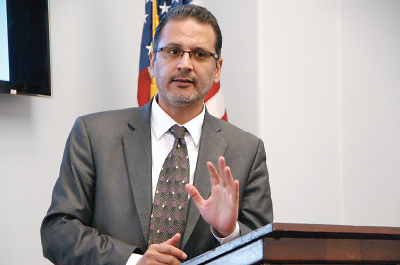The head of the only independent mental health system in one of the most troubled corners of the world came to Washington, D.C., this winter to tell Americans about providing care under difficult circumstances.
Mental health care in the Gaza Strip is continually burdened by ongoing conflict, political tensions, poor access to the outside world, and far too little in the way of medical resources, said Yasser Abu Jamei, M.D., director of the Gaza Community Mental Health Programme (GCMHP). He spoke to Congressional staffers and later in an interview with Psychiatric News.
The GCMHP began in the late 1980s, in response to the traumas engendered by the First Intifada, the uprising against Israel’s occupation of Gaza and the West Bank. At the time, Gaza’s psychiatric hospital served only serious mentally ill inpatients. A Gazan psychiatrist, the late Eyad El-Sarraj, M.D., sought to create a community setting for less acute cases, especially for children. Referrals first came from other medical professionals, including neurologists, internists, and emergency room physicians.
The GCMHP today enrolls a total panel of 50,000 patients and normally sees 750 to 900 new cases annually at three clinics—in Gaza City, Deir el-Balah, and Khan Yunis—and two smaller outlying clinics. About 70 percent of the clinic visitors are children, and each site is equipped with rooms for play and art therapy.
In addition to providing clinical services, El-Sarraj and his colleagues also began a public education campaign to help reduce the cultural stigma associated with mental illness.
Today, there are few sources of mental health care in the Gaza Strip aside from the GCMHP, said Abu Jamei. The Ministry of Health offers some services through community health centers.
The United Nations Relief and Works Agency for Palestine Refugees in the Near East (UNRWA) supports community mental health counselors in all of the 252 schools it operates, said Abby Smardon, M.A., executive director of American Friends of UNRWA, in Washington, D.C.
“The counselors also make home visits to evaluate family settings and can provide counseling to parents, who are less likely to seek help,” she said.
However, beyond those options, GCMHP can provide more specialized mental health services to both adults and children, said Abu Jamei.
Since the 2014 fighting between Israel and Hamas-controlled regime in Gaza, working with UNICEF’s Child Protective Cluster, care for children has included social or family responses, community supports, and focused treatment of people with diagnosed mental illness. The latter is provided by the GCMHP and is the equivalent of tertiary care in a general medical setting, said Abu Jamei.
One year after the similar escalation in 2012, the GCMHP recorded symptoms of posttraumatic stress in about 30 percent of exposed children, he said. Those symptoms included bedwetting, night terrors, sudden drops in school achievement, and general misbehavior.
Today the organization employs 70 professionals of all kinds. It draws on graduates of programs in medicine, psychology, and nursing and provides them with a two-year training program in community mental health. The first year includes didactic modules in psychiatry, clinical psychology, child development, social psychology, counseling, and psychotherapy. The second year is devoted to clinical training in community settings, both in clinics and in schools, primary care clinics, and hospitals.
Many challenges remain, said Abu Jamei. The GCMHP receives no government funds, said Abu Jamei. It depends on a consortium of donors, including the Swedish and Swiss development agencies and the Norwegian representative to the Palestinian Authority.
Medications are available but expensive. Ordinarily, the GCMHP buys about $90,000 worth of drugs a year to give to patients who cannot afford them, although that figure has risen to $125,000 since the 2014 fighting because of the increased patient load.
Maintaining clinical skills is not easy, given the difficulties of travel in and out of Gaza. “Professionals feel abandoned by the international community after the fighting stops,” Abu Jamei. “We need to connect with others in our field to gain more skills and experience. It is good to bring in people from abroad, but it would be better to send our people out for long-term internships. I would like the opportunity to have a Gaza psychiatrist come to the U.S. for trauma training.”
Staff members receive short training courses from foreign (mainly European) experts who visit once or twice a year for a week at a time, said Abu Jamei.
Last year, a Swedish team that included a child psychiatrist and a pediatric neurologist trained staff and parents on aspects of autism. A German group offered a one-week course on psychodrama, and German and Swiss teams are in the midst of a three-year program providing supervision for a “care-for-caregivers” program.
Ultimately, it will be the GCMHP’s patients—especially the youngest—who will benefit from reconstruction and renewed contact with the rest of the world, he said. “Children in Gaza, like all children, have a right to good health, hygiene, food, and education, but also to play.” ■
The website of the Gaza Community Mental Health Programme can be accessed
here.

